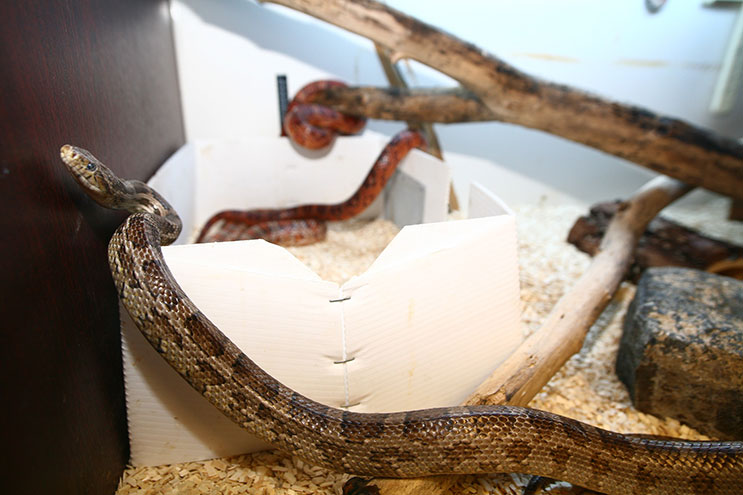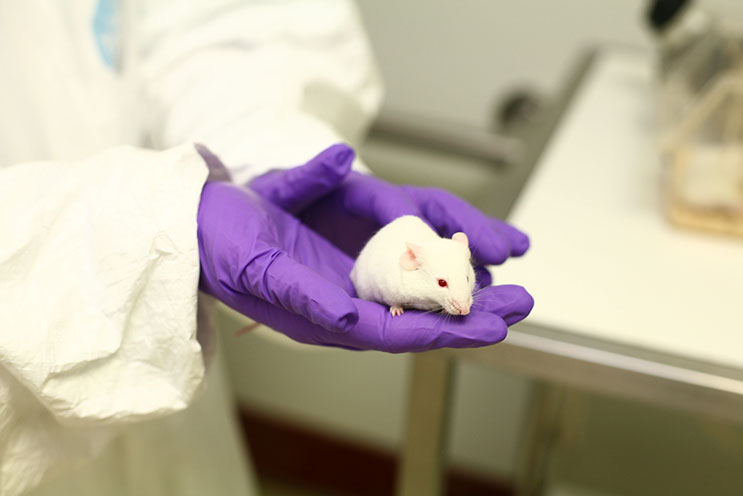Biological Services at King’s College London is comprised of multiple research facilities in six separate units across four different sites.
More than 65 animal technologists work within these units to support approximately 90 project licence holders and 900 personal licence holders at the University and the associated King’s Health Partners.
The department is overseen by the Director of Biological Services, alongside a centralised senior management team. Each facility has its own manager, technical manager, advanced animal technologist, animal and trainee animal technologists.
As animal technologists become more experienced they are often involved in helping research scientists with their experiments. This can range from dosing of animals with treatments to breeding genetically altered mice and rats.
In order to perform this role, animal technologists first have to obtain a Home Office Personal Licence. All animals technologists at King’s regularly undergo continuing professional development (CPD) through a number of opportunities both in-house and externally.
Named persons
Working under Animal Scientific Procedures Act, we are required by law to have certain individuals named on the Establishment Licence:
- Establishment Licence Holder (ELH) – At King’s, the ELH is a senior member of management staff. The ELH has overall responsibility for ensuring that Biological Services users at King’s comply with the Animal Scientific Procedures Act, that the Animal Welfare and Ethical Review Bodies are run appropriately and that animals have appropriate care and accommodation. All project licence applications to the Home Office have to be countersigned by the ELH.
- Named Veterinary Surgeon (NVS) – A member of the Royal College of Veterinary Surgeons. The NVS has responsibility to provide advice on the health, welfare and treatment of animals housed at King’s, pre- post- and during experiments. The services of the NVS may be called upon at any time, any day of the year.
- Named Animal Care and Welfare Officer (NACWO) – responsible for over-seeing the day-to-day husbandry, care and welfare of animals held within the establishment. All site managers and unit managers at King’s are NACWOs.
- Named Training and Competency Officer (NTCO) – ensures all staff working with animals are adequately educated, trained and supervised and that they continue to undertake further training to maintain their expertise.
- Named Information Officer (NIO) – responsible for ensuring that staff dealing with animals have access to information they may need relating to the species and procedures that they use. All NACWOs at King’s are also NIOs.
We house many different species of animals at King’s College London, including mice, rats, fish, rabbits, guinea-pigs, amphibians, marmosets and snakes. The most common species are mice (~79% of our animals) and zebrafish (~19% of our animals).
At King’s, we currently have the capacity to hold up to 40,000 mice and 50,000 zebrafish at any one time. A purpose-built, state of the art zebrafish facility was opened in 2013.
Every year, the Home Office publishes the number of animals that have been used for scientific procedures in the United Kingdom. At King’s College London, we are committed to being open about the animals we use for our research.
The numbers that we publish reflect the total number of animals used during each calendar year, including those that have been used for scientific procedures, breeding purposes and used for tissue only purposes.
Below are the figures for the number of animals used for scientific purposes at King’s College London from 2019 – 2023:
| Species |
2019 |
2020 |
2021 |
2022 |
2023 |
|---|
| Amphibians |
0 |
58 |
272 |
136 |
26 |
|---|
| Fish |
33,611 |
15,490 |
19,574 |
17,497 |
20,777 |
|---|
| Guinea pigs |
311 |
71 |
32 |
0 |
0 |
|---|
| Marmosets |
17 |
0 |
0 |
0 |
0 |
|---|
| Mice |
94,416 |
68,394 |
89,258 |
85,918 |
87,132 |
|---|
| Rabbits |
27 |
0 |
15 |
12 |
0 |
|---|
| Rats |
3,617 |
1,401 |
2,599 |
1,578 |
1,844 |
|---|
| Reptiles |
0 |
0 |
0 |
0 |
0 |
|---|
| Total |
131,999 |
85,414 |
111,750 |
105,141 |
109,779 |
|---|
Animals used for scientific procedures
These are animals that have been used for experiments under the authority of a project licence. Only individuals with a personal licence are able to carry out these procedures. Breeding of genetically altered animals is included as a scientific procedure.
Our animal technologists feed and water the animals, wash their cages, ensure rooms are kept clean and that equipment, e.g. antiesthetic machinery, is well maintained. Some animals require modified diets that may be prepared by the animal technologists.

Being in daily contact with the animals and understanding their behaviour means that early signs of disease and unusual behaviour can be detected. They can also carefully monitor the welfare of animals that are undergoing experiments. They will report any concerns to the research scientists responsible for the animals, the Named Animal Care and Welfare Officer and the Named Veterinary Surgeon.
Biosecurity
To ensure our animals are healthy and disease-free all colonies are maintained in an environment with a high level of biosecurity.
A large proportion of our mice are housed in individually ventilated cages which prevents the transfer of potential infections from one cage to another. Routine health surveillance is carried out on all of our animals.
In order to maintain the health status of animals in the Biological Services Unit, a number of controls on movement of animals, people and biological products are necessary.
Microbiological health monitoring in laboratory rodents is an important consideration in animal studies. Maintaining a high health status in our animals therefore facilitates good welfare and good science.

Animal Welfare and Ethical Review Body (AWERB)
The AWERB is a local framework acting to ensure that:
- all use of animals in the establishment is carefully considered and justified
- best practice is adopted to maximise animal welfare and that experimental methods comply as closely as possible with the 3Rs (replacement, refinement, reduction of the use of animals)
- high standards of accommodation and care are achieved.
King’s College London has three AWERB committees to cover research on:
- Guy’s Campus
- Denmark Hill Campus
- Waterloo Campus
AWERB meetings are usually held on a monthly basis on each site.
The AWERB consists of the local Named Animal Care and Welfare Officer(s), the Named Veterinary Surgeon, the Named Training and Competency Officer(s), research scientists and a lay person. One of these persons acts as the Chairperson.
An important role of the AWERB is to provide advice to the Establishment Licence Holder, who will not approve any project licence application without the approval of the relevant AWERB.
Home Office licences
The welfare of animals in research is protected by law. The Animals (Scientific Procedures) Act 1986 (ASPA) and Amendment Regulations 2012 protect all animals used in procedures for scientific purposes. This Act is implemented by the Animals in Science Regulation Unit (ASRU) of the Home Office. ASRU comprises of inspectors, licensing officers and those responsible for formulating policy.
In order for an individual to perform procedures on animals under the ASPA and Amendment Regulations 2012, three types of Home Office licence must be obtained from ASRU:
(1) An establishment licence for the place at which the work is carried out
(2) A project licence for the programme of work
(3) A personal licence for each person carrying out procedures on animals
The establishment licence holder must put in place measures to ensure that the regulated activities carried out at the establishment are performed in a manner that is consistent with the principles of replacement, reduction and refinement of the use of animals (3Rs).
The institution's Animal Welfare and Ethical Review Body (AWERB) plays an important role in ensuring that this requirement is met within all projects carried out at the institution that involve the use of protected animals.